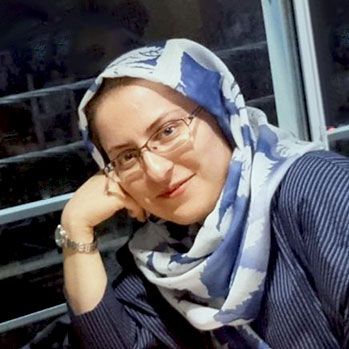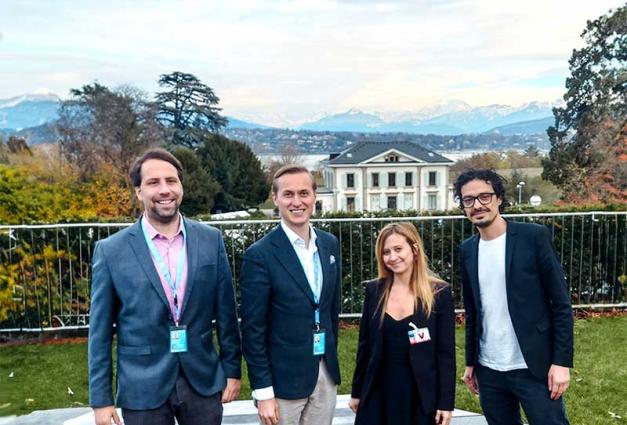The senior editorial team at Personality and Social Psychology Review (PSPR) is excited to announce that Dr. Pegah Nejat has been selected as the next PSPR Editorial Fellow. Dr. Nejat is an Assistant Professor of Social Psychology at Shahid Beheshti University (SBU) and Director of the SBU Social Psychology Lab.
The Editorial Fellowship is sponsored by SPSP, in service of the organization's core values of innovation, rigor, diversity, and inclusiveness. This program seeks to create a supportive pathway to editorial leadership for psychologists from communities that have been historically excluded from these roles. In contrast to many editorial fellowship programs in academic psychology, the PSPR senior editorial team has focused this fellowship on scholars in the Global South and Indigenous scholars across the world.
The PSPR team is thrilled to welcome Dr. Nejat and looks forward to learning from her experience and expertise. Learn more about Dr. Nejat and her work below.
Q&A with PSPR Editorial Fellow

Pegah Nejat, PhD
Assistant Professor of Social Psychology at Shahid Beheshti University in Iran (SBU), and Director of the SBU Social Psychology LabWill you please tell us a little about your own research?
Broadly, implicit social identities, stereotypes, self-esteem, and attitudes have constituted my focus throughout the years. The most salient themes of my current research, however, include moral psychology and intergroup perception, affect, and behavior. I have explored the moral underpinnings of diverse cultural issues such as conspiracy beliefs, immigration intention, justice beliefs, perception of immigrants, and reaction to threats. Moreover, I have used established stereotype frameworks to examine perception of social groups including immigrants, people with psychopathology, and perpetrators/victims of honor aggressions in the context of my Iranian culture. I supervise the Social Psychology Lab at Shahid Beheshti University. Together with my enthusiastic students, we have conducted studies on the topics listed above, as well as some on self and identity, person perception, effects of exposure to social media, and social judgement.
Why were you interested in the Editorial Fellowship?
As a female early career Middle-Eastern social psychologist, I see the opportunity of the Editorial Fellowship at PSPR as extremely valuable and vitally important. First of all, it will enable me to connect to and collaborate with social/personality psychologists from around the globe. Second, I'll be able to witness the process of editorship in a high-impact journal, and be mentored by high-profile social/personality psychologists. Finally, this experience will help me develop so I can contribute to editorship in international journals, in addition to founding and leading social psychological journals in my own country of Iran. Given that social psychology is a rather young branch of psychology in my country, compared to more established branches such as clinical, educational, developmental, and cognitive, very few mentors and role models in high editorial positions of the field have been available to me, making my progress painfully hard and time-consuming. As such, this opportunity marks a significant milestone in my career trajectory.
Will you please describe how you hope to share what you learn from the fellowship more broadly?
First of all, I am going to use the experience to direct my research and my career, as an instructor, faculty member, and lab supervisor. Second, I wish to be able to act as mentor and facilitator to young scholars interested in pursuing social and personality psychology in my country.
Along with the 2023 PSPR Editorial Fellow and other members of the PSPR team, you are co-editing a Special Issue of the journal focused on highlighting personality and social psychological theory from the Majority World. Would you please tell us a little about why the team chose to develop this Special Issue and what your hopes are for it?
I highly appreciate this initiative conceptualized by the PSPR editorial team, and welcome the fact that it provides non-Western scholars with the opportunity to contribute to the ongoing theoretical work in social and personality psychology, most particularly enriching it with Indigenous notions. This constitutes an important step toward incorporating conceptual and theoretical perspectives from non-Western settings, which speak to context-sensitive experiences of people beyond those who are most often studied by Western psychologists. Despite these settings constituting the majority of the world's population, their voices have been rather underrepresented throughout the science and practice of psychology. PSPR, as a well-established journal in the field, with its notably diverse Editorial Board and Emerging Editorial Board, is in a good position to facilitate such an endeavor. I have already taken advantage of this opportunity to invite social/personality psychologists from South and East Asian, Middle Eastern, African, and Latin American countries, to submit their conceptual and theoretical work to this special issue of PSPR. We hope that contributions to this special issue will fulfill two important goals: First, to catalyze dialogue between Western and Majority World scholars; and second, to contribute to a truly global science of personality and social psychology.
Will you please offer a wish for the future of our field?
I wish for a truly international and intercontinental personality and social psychology, taking into account the lived experiences of people from diverse cultural backgrounds, encouraging intercultural understanding and peace, as well as working towards the eradication of prejudice, radicalism, oppression, and discrimination. Economic and political hurdles have long played a significant role in setting back non-Western scholars from making the kinds of contributions to the field that they are capable of making. My hope is that studies from non-Western contexts be more fully represented in both empirical and theoretical outlets of the field to ideally lead to a more comprehensive and less biased understanding of human social functioning as situated in its geographical, ecological, historical, economic, and socio-political context.
--
For more information about Personality and Social Psychology Review, please visit their website. To learn more about other academic journals affiliated with SPSP, visit the Journals page.




